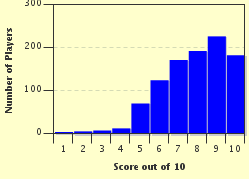Quiz Answer Key and Fun Facts
1. Atakapa is an extinct language that was once spoken in which of the following continents?
2. Negerhollands is an extinct language that was spoken for many years on which island group that was once known as the Danish West Indies?
3. The Beothukan language became extinct along with the last of the Beothuk people in 1829. Which Atlantic island(s) did the Beothuk call home?
4. This European extinct language was spoken in parts of Croatia and Montenegro. It was once the official language of the Republic of Ragusa. Its name comes from a region east of the Adriatic Sea and is also used for a dog breed. Which language is referred to?
5. Once spoken in modern day Spain and Portugal, which of the following is a language that died out in the 2nd century A.D. after it was replaced by Latin?
6. A relative of the Celtic language, this extinct language was once widely spoken through much of Europe, including present-day Belgium, France, Luxembourg, Switzerland, northern Italy, and western Germany. What language?
7. Some of the extinct languages in North America were spoken by native American tribes. One of them belongs to the Iroquoian language group. The name of the language comes from the river surrounding the area the tribe lived in, in the present American states of New York and Maryland. What is this language called?
8. Easterian is the extinct language that was once spoken by the indigenous people of the Easter Islands.
9. Sumerian is the oldest known extinct language in the world for which there is unequivocal written evidence.
10. One of the oldest languages on record, it evolved into Demotic in the 7th century BCE, then further into Coptic in the 3rd century BCE. General use of the Coptic language lasted until the 17th century CE, but since then has only been used as part of the Christian Coptic Church's liturgy. What was the original language from which the Demotic and Coptic derived?
Source: Author
dcpddc478
This quiz was reviewed by FunTrivia editor
Bruyere before going online.
Any errors found in FunTrivia content are routinely corrected through our feedback system.

